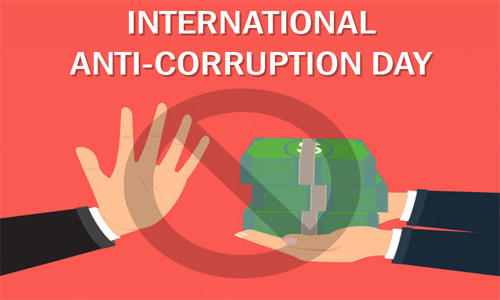International Anti-Corruption Day is observed every year on December 9th. This began with the adoption of the United Nations Convention against Corruption in 2003, which Afghanistan ratified in 2008. We, the Ambassadorial Anti-Corruption Group*, call on the Government of Afghanistan and its people to join forces to combat and prevent corruption.
Afghanistan remains among the 10 countries most affected by corruption in the world. In the 2019 Asia Foundation Survey of the Afghan People, 81.5% of respondents find corruption as a major problem in Afghanistan. Corruption erodes public trust in institutions, undermines good governance and fuels conflict.
We welcome steps to improve the legislative and policy framework to fight corruption, including the new Penal Code, the Law on Access to Information and the dedicated Anti-corruption Law. The 2016 establishment of the Anti-Corruption Justice Centre (ACJC) and the implementation of the 2017 Anti-Corruption Strategy are further steps in the right direction and so is the recent establishment of the Office of the Ombudsperson.
We now urge the Government to concentrate on improving the enforcement of recent legislative, policy and institutional changes. The ACJC can only act as a deterrent if it is able to try high-level corruption cases in a fair and transparent manner. Outstanding court verdicts must be enforced and convicts must serve their prison sentences. In order to confront the ongoing impunity that exists around corruption cases, the Government must enforce the outstanding arrest warrants, summonses and travel bans.
The 2017 Anti-Corruption Law introduced a new and independent Anti-Corruption Commission, fulfilling a clear obligation under the UN Convention against Corruption. The Government and civil society must now work together to establish the Commission as soon as possible. We encourage the government to consider integrating every possible parallel structure into the Anti-Corruption Commission to avoid duplication and fragmentation of efforts. Strengthening the independence and capacity of the Supreme Audit Office to audit state expenditures will be another driver for progress.
The 2017 Anti-Corruption Strategy will expire in December 2019. As a matter of priority, the Government must draft a new long-term strategy, building on lessons learned from the current strategy, in consultation with relevant government institutions, civil society, and the international community. Long- existing and newly created anti-corruption bodies must be fully staffed and funded so that their independence will be guaranteed.
Studies show that nations which fight corruption and improve their rule of law can increase their national income by 400%. Fighting corruption is a key enabler of a self-reliant Afghanistan. Therefore, we call on the Government to pay particular attention to the effective management and oversight of customs, procurement and mining. For Afghanistan to successfully fight corruption every citizen should be a whistle-blower and all whistle-blowers must be protected.
We honour the sacrifices of government, justice and judiciary employees and of civil society activists, who have been targeted because of their efforts to work against corruption. Some of these brave individuals have even paid the ultimate price. And we commend the courage of those who continue the fight. The International Community stands by their side.
* The Ambassadors Anti-Corruption Group is comprised of the Heads of Mission for the United Nations Assistance Mission in Afghanistan, Denmark, Germany, Japan, United States of America, Australia, Canada, Italy, Norway, World Bank, NATO Senior Civilian Representative, Combined Security Transition Command-Afghanistan, United Kingdom (UK), and European Union (EU). It is co-chaired by EU and UK and is convened bi-monthly.
Home » Opinion » Ambassador’s Op-Ed: Every Afghan Citizen Should be a Whistle-blower
Ambassador’s Op-Ed: Every Afghan Citizen Should be a Whistle-blower
| By: Ambassador of Anti-Corruption Group

